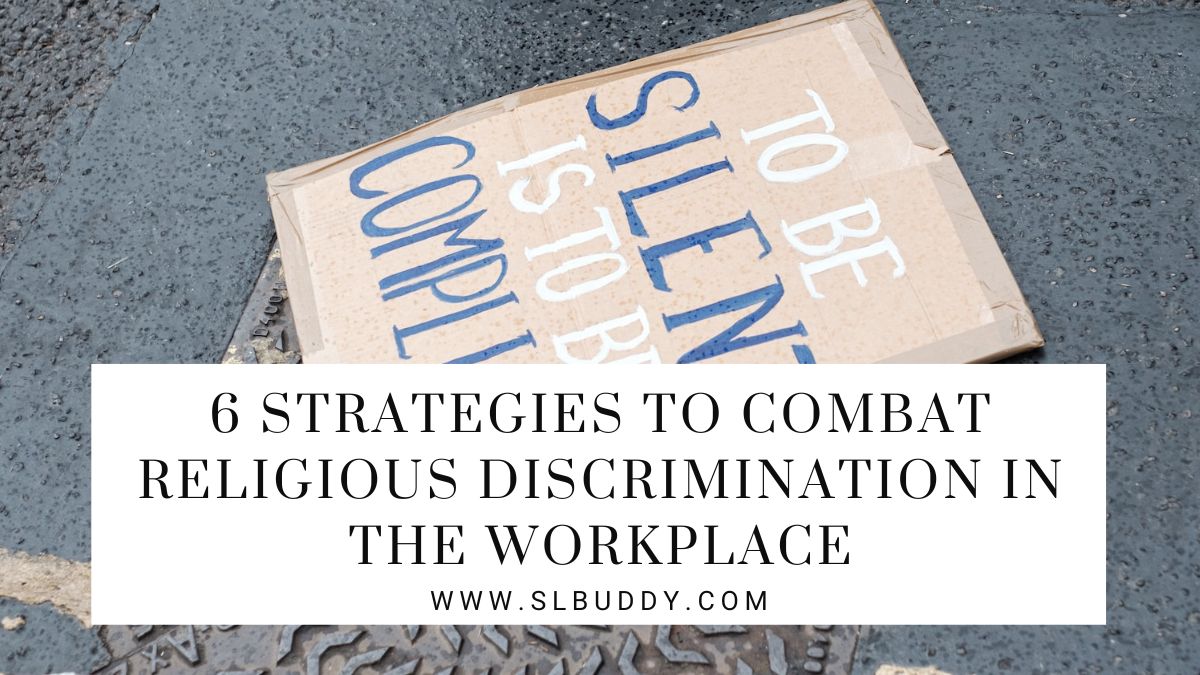
Religious discrimination has become an increasingly pressing problem in workplaces around the world, with individuals of all faiths and backgrounds being targeted for their beliefs.
Employees who face religious discrimination can suffer from decreased job performance, increased stress levels, and a lack of motivation to continue on at their place of work.
The good news is that they have many tools available to them to combat this type of discrimination in the workplace.
By understanding what religious discrimination looks like and developing specific strategies tailored to fit each workplace, employers can significantly reduce the amount of prejudice experienced by employees of faith.
In this blog post, we will give you 6 simple yet effective strategies for combating religious discrimination in your own office environment.
Understand Your Rights and Consult a Lawyer
No one should ever have to face religious discrimination in the workplace. However, if it does happen, it is important to know your rights and options.
First and foremost, become familiar with the laws governing religious discrimination. The Equal Employment Opportunity Commission (EEOC) is a great resource for employers and employees alike to learn more about their rights and responsibilities under the law.
Another important step is to consult with a knowledgeable lawyer who specializes in this area of law. When you seek out the advice and guidance of religious discrimination attorneys, you can gain a deeper understanding of your rights and the best course of action to take if you encounter discrimination in your workplace.
Remember that it’s always better to be informed and prepared rather than caught off guard.
Speak Up
Religion is a personal choice and one that deserves respect. Unfortunately, discrimination based on religion still exists in our society.
If you feel that you have been treated unfairly due to your religion, don’t suffer in silence.
Speak up about the injustice and use your voice to stand against discrimination.
Be sure to document any instances of religious discrimination with dates, times, and names of those involved.
It may also be helpful to bring in a third-party mediator – such as a union representative or another manager – who can ensure that you are treated fairly and respectfully going forward.
Create a Support Network
It’s no secret that living as a person of faith can come with its challenges. Whether it’s navigating cultural differences or simply encountering prejudice, religious minorities often face discrimination and harassment.
In this case, you want to cultivate a strong support network of allies who can shoulder the burden and provide a safe space when times get tough.
Building these connections takes time and effort, but the payoff is immeasurable.
From offering emotional support to advocating for your rights, your support system can empower you to stand up to intolerance and live your life with confidence and pride.
Document Everything
The importance of documentation cannot be overstated, especially in cases of discrimination.
Keeping records of any instances of discriminatory behavior can provide critical evidence in the event that legal action is taken.
Documenting these incidents with as much detail as possible can help you build a strong case and ensure that justice is served.
It can be through written accounts, audio recordings, or video footage — know that having a comprehensive record of discriminatory behavior can make all the difference in proving your case.
Documentation can be a powerful tool in the fight against discrimination, so don’t hesitate to start keeping records and proof whenever possible.
Know Your Resources
When faced with religious discrimination, it can be difficult to know where to turn for support and guidance.
Fortunately, there are a number of resources available to assist individuals who have been the targets of religious bias.
The American Civil Liberties Union (ACLU) is an excellent resource for religious liberty and civil rights issues.
The nonprofit provides legal advice and helps people understand their rights under the law.
Additionally, the EEOC provides a wealth of information and resources for anyone who wishes to combat workplace discrimination.
You can even reach out to faith-based organizations such as the Council on American-Islamic Relations (CAIR) or the Sikh American Legal Defense and Education Fund (SALDEF).
These organizations are dedicated to protecting religious minorities from discrimination and can offer important guidance for those experiencing prejudice.
Take Action
When discrimination based on faith persists despite all attempts to address it, taking legal action may be the best option.
While it can be a very difficult decision to make, it is important to stand up for your rights and not tolerate discriminatory behavior.
Legal action can bring justice to you and send a message to others that such behavior is not acceptable.
Just keep in mind that you are not alone and there are resources available to help you navigate the legal system.
Taking action may not only benefit you but also others who may face similar challenges in the future.
What to Do If You’re an Employer
Religious discrimination in the workplace has a lasting impact on both employers and employees.
To ensure that everyone in your organization is treated with dignity and respect, create a zero-tolerance policy for any form of religious discrimination, no matter how small it may seem.
Ensure all managers are trained on the law and the policies set forth by your company.
As an employer, it is your responsibility to take proactive measures to prevent religious discrimination from occurring in the first place.
Establishing a safe and inclusive workplace environment is essential for creating an atmosphere of understanding and acceptance.
Also, be aware of any potential religious bias in hiring practices. Take steps to ensure that all new hires are considered without prejudice or preconceived notions based on faith.
Remember that everyone deserves a fair chance and should be evaluated purely on their qualifications!
Don’t miss: Educational Requirements to Be a Lawyer
The bottom line
Religious discrimination is a serious issue that needs to be addressed with urgency and determination.
Whether you are an employer or an employee, it is crucial to understand and respect the laws that protect individuals from discrimination based on their religious beliefs.
Everyone deserves to be treated with dignity and respect, regardless of their faith.
By following these steps, we can collectively create a more inclusive, tolerant, and fair society where everyone’s religious beliefs are respected.
Remember that your voice matters and can make a difference in the fight against religious discrimination.














